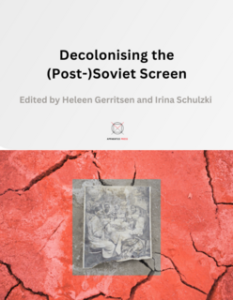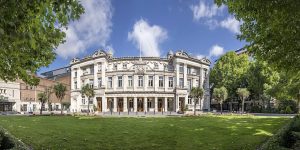CEREES Discussion & Book Launch
Monday 2 December, 18:00-20:00
‘Decolonising the (Post-)Soviet Screen’

Venue: Queen Mary University of London, Mile End Road London E1 4NS — The exact room will be emailed to registered attendees in advance.
Book here: Eventbrite
About the Panel:
About the Speakers:
Assiya Issemberdiyeva is a PhD student at the School of Languages, Linguistics and Film, Queen Mary, University of London. She studied Journalism at the Al-Farabi Kazakh National University (BA, MA) and Film Studies at the Queen Mary University of London (MA). In 2021 she obtained a Collaborative Doctoral Award in Visual Cultures funded by the Arts and Humanities Research Council through the London Arts and Humanities Partnership with a thesis on British attitudes to the representation of Soviet Non-Slavic identities. Her project looks at the representation of Central Asian narratives in wartime Soviet cinema and the structure within which it was produced, analysing its reception both in the USSR and in Great Britain. The working title of her thesis is British Attitudes to Non-Russian Identities in World War Two Campaigns for British Aid to the Soviet Union.
Adelaide McGinity-Peebles (FHEA) is a Lecturer in Film and Television Studies in the Department of Communications, Drama and Film at the University of Exeter. Her research focus is on contemporary Arctic, post-Soviet, and Indigenous film and media. Her recent research project (sponsored by the Leverhulme Trust) investigated the representations of the Russian Arctic in contemporary film. From this project, she is currently completing a monograph titled Russian Arctic Cinema: Figurations of the Russophone North in Contemporary Film, under contract with Edinburgh University Press. She has published on the topics of ethnicity, race, gender, sexuality, and the environment in Arctic, post-Soviet, and Central Asian film and media.
Anisa Sabiri is a filmmaker and teacher based at the University of Central Asia in Naryn. Her work focuses on concepts of identity and memory, and the search for an indigenous Central Asian language in cinema. For several years, she worked as a tour guide in the Pamir mountains while building her profile as an avant-garde novelist, photographer and activist, before making her shorts Nolai Tanbur / The Crying of Tanbur (2018) and Az Alla To Vobalam / Rhythms of Lost Time (2021), featured at the Busan International Film Festival, Dokumenta-15, BOZAR, Asian Film Archive and other platforms and festivals worldwide. Sabiri is also an active promoter of the horizontal-based network in Central Asian art and education. She has been guest lecturing and running workshops for filmmakers with the University of Central Asia, Open Society, Internews, the Institute for War and Peace, and was a speaker at international platforms and events associated with European Film Market, UNESCO, TED Mastercard, Basel Peace Forum. Her film projects in development were featured at Berlinale, Ji.hlava International Film Festival, Sheffield IFF, CineDoc Tbilisi, and goEast East-West Talent Lab, among others. She holds an MA in Screenwriting from the London Film School with the support of the UK-government CHEVENING Scholarship, from which she graduated with the Outstanding Screenwriting Award in 2021. She is an alumna of the Busan Asian Film Academy, EFM Doc Toolbox-23, and the Sheffield Future Producers School. She is a member of Directors UK and the Documentary Association of Europe.
Serian Carlyle is a PhD student at UCL SSEES, funded by a Wolfson Postgraduate Scholarship in the Humanities. For her PhD, she is analysing the production of youth cinema at the Gorkii studio in the late Brezhnev period, to demonstrate how the models of ideal young heroes in different genres reflect the state’s national and racial anxieties. She previously co-authored a chapter on the depiction of abortion in Soviet cinema with Dr Rachel Morley, published in Gender and Authority across Disciplines, Space and Time, edited by Adele Bardazzi and Alberica Bazzoni. Outside academia, she has worked in charities, particularly around issues of anti-oppression and diversity.
Dusan Radunovic is Associate Professor/Director of Studies (Russian) in the School of Modern Languages and Cultures, where he teaches Russian social and cultural history and film studies. He is the author of a monographs on the genesis of the concept of form in the twentieth-century Russian humanities (forthcoming) and on Mikhail Bakhtin (in Serbo-Croat, 2012) and co-editor of the volume Language, Ideology, and the Human: New Interventions (Routledge, 2012). His monograph on the concept of form in twentieth- century Russian humanities is being prepared for publication.
Natascha Drubek-Meyer is a researcher, author and editor in the area of Central and East European literature, film and media. Since 2012 Drubek has been teaching comparative literature, and film and media studies, at the Free University of Berlin (in 2020-21 as professor of the FONTE-Stiftung]. Drubek is one of the developers of Hyperkino and the editor-in-chief of the open-access academic journal Apparatus.
Irina Schulzki is the publishing director of the journal Apparatus. Film, Media and Digital Cultures in Central and Eastern Europe. She has authored book chapters and journal articles on gesture across film, literature, and art; fan fiction; theories of the comical; phenomenology and media; Mikhail Shishkin’s prose; and Kira Muratova’s cinema. Among her edited publications is Decolonising the (Post-)Soviet Screen, with Heleen Gerritsen (Apparatus Press, 2024). She is currently completing the co-edited volume (with Irina Gradinari), ReFocus: The Cinema of Kira Muratova (under contract with Edinburgh University Press, forthcoming 2025).
Event outline:
Welcome, by Andy Willimott & Jeremy Hicks (QMUL) – 18:00
Panel Discussion – 18:05
Discussion, chaired by Natalya Chernyshova (QMUL) – 18:50
Drinks reception, meet the speaker – 19:10

Shape the Conversation
To join our mailing list, participate in our programme of events, or find out how we can support your research, please contact hss-cerees@qmul.ac.uk

